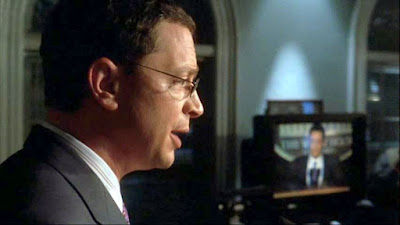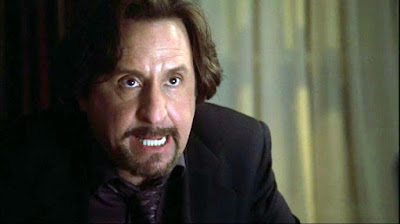Original airdate: January 22, 2006
Written by: Eli Attie (18)
Directed by: Christopher Misiano (26)
Synopsis
- An accident at a nuclear power plant in California forces President Bartlet to make life-and-death decisions, Senator Vinick to confront his support for nuclear power (and his assistance in getting that very power plant online), and Josh and Matt to control their instincts to try to take political advantage.
Disaster looms around every corner in this thriller of an episode. Of course the main disastrous plotline is the nuclear power plant accident in San Andreo, California, threatening tens or even hundreds of thousands of people, but we've also got: the potential disaster for Senator Vinick, if word that he pulled strings and pushed hard to get the plant open 25 years ago should break; a similar political disaster for Matt Santos, if Josh decides to go along with Bram and Helen to open up on Vinick for his support of nuclear power, threatening a powerful return attack saying Santos is "politicizing" a potential tragedy; and, overseas, a possible disaster in Kazakhstan, as rigged elections and violent responses to protest cause both the Chinese and Russian armies to cross the border.
President: "I want the FEMA director and the chair of the Nuclear Regulatory Commission in here right away. Get CNN to stop running rumors. I'll make a statement in 15 minutes."
Kate: "Sir, you really don't want to notify the public until there's a plan in place. There could be widespread panic."
President: "Then we'd better get moving on a plan, because I'm making a statement in 15 minutes."
And then by stressing the entire federal response will be going through him and him alone:
CJ: "Mr. President, with all the levels of government involved in this maybe now's a good time to designate a czar, a single point person to oversee --"
This eventually turns out to weigh heavily on President Bartlet, when his decision to order engineers into the radiation-filled reactor room - and then stay longer than planned, to try to close valves - ends up with tragic results.President: "You're looking at him."
CJ: "Seventeen minutes ago, at 6:02 Pacific Time, sirens went off at the nuclear generating plant in San Andreo, California. The main feedwater pump failed. Everything proceeded as expected: a relief valve opened to let the water escape, the reactor scrammed -"
President: "Shut itself down."
CJ: "But now a valve is malfunctioning and coolant has stopped flowing into the reactor's core."
President: "If they can't get coolant into the core -"
CJ: "The uranium fuel rods become exposed, which makes them highly combustible. We could be looking at a full-scale nuclear meltdown."
In addition, another valve has failed, causing radioactive steam to build up inside a structure that wasn't built to contain it, risking an uncontrolled release of radiation over southern California. Even running a new pipe of water into the core to cool it is problematic, as it only increases the pressure of the steam being released.
As the campaigns react to news of the accident, this turns out to be one of the rare instances in which both Matt's and Josh's instincts align. Usually Josh is more of a "shoot first, ask questions later" kind of campaign manager ... but as we've seen in plenty of episodes going back to Opposition Research and Freedonia, Matt tends to have a more subtle, reasoned approach to events, and we've usually seen him be right. In this case, they both see the benefit of playing it cool, staying quiet while the accident unfolds, and not risk the outcome of getting criticized for "playing politics" with a disaster that could affect, frankly, millions.
Josh: "I say we go completely dark. Let the press go after Vinick on their own, so they can't accuse us of playing politics."
Matt: "I'm fine doing nothing on this issue."
Josh: "I mean nothing on any issue: no speeches, no press releases. We just ... stay right here."
Matt: "See which way the wind blows."
This also has the benefit of driving Bruno nuts. Bruno knows how Josh works (they worked together pretty closely in Bartlet's re-election campaign of 2002), and he fully expects him to go full-out on the attack against Vinick, using his support of nuclear power as a hammer while exploiting this potential disaster in California. While Vinick's staffer Bob keeps pushing to have Vinick make a statement or attack federal regulations to try to change the subject of supporting nuclear power into "it was the fed's fault," Bruno puts the kibosh on those ideas, knowing deep down that Josh can't stay quiet all night.
He's almost right, particularly after Josh finds out about Vinick's pressure to open the San Andreo plant 25 years earlier. He knows that will give Vinick's campaign a big hit, and he's frustrated that the ongoing events mean the news media don't have the information he does.
As the pressure builds inside the containment buildings at the power plant, the pressure builds on the President as well. He's told in order to keep the uranium rods cool, two engineers must go inside the reactor room to open the malfunctioning valve and restore the flow of coolant. As they're inside, he's additionally informed the only way to avoid a potentially cataclysmic rupture of another building, spewing uncontrolled amounts of radioactive steam across southern California, is to keep those engineers inside longer, in order to close off the valve leaking steam into the building not built to hold the pressure. Bartlet reluctantly gives the order, potentially trading off two lives for those of tens of thousands. It's a call that weighs heavy on him, particularly when he's later told one of those engineers has died.
Speaking of pressure, the pressure on the Santos and Vinick campaigns continues to grow, particularly after President Bartlet decides he's going to fly to San Andreo and bring the California congressional delegation along with him - which includes Senator Vinick. The idea of the Republican candidate being seen with the President handling a crisis is almost too much for Josh to bear - it could be disastrous for Matt's campaign. Meanwhile, Bob continues to press for Vinick to make a statement before he goes, just to get in front of the press and say something. Bruno, continuing to count on Josh losing his cool and going after Vinick, tries to stamp out the idea - but Vinick insists on it.
And when Vinick can't help himself, going off script and lashing out at federal regulators, Bruno has quite the "I told you so" look at Bob:
But Bruno is right: this trip to California with the President is the straw that broke Josh's back. Josh finally folds, telling Donna to go out to the press and drop hints, breadcrumbs, anything to get the press to report on Vinick's past relationship with the San Andreo plant. This time, though, Josh's waiting to use the information he got turns out to be well-timed; the reporter Donna goes to already has the story and is writing it up as they meet.
Almost simultaneously with the press getting the Vinick story, a second team of engineers closes the steam relief valve inside the reactor room, and the crisis is over. At least, the immediate crisis for southern California ... Vinick's enthusiastic support of nuclear power and his pushing to get this very plant started years ago, coupled with Matt's position against nuclear energy, has changed the outlook on the Presidential race. States that were firmly in the Vinick camp are starting to waver. Electoral votes Vinick thought he could count on are now up in the air. And we see both campaigns reacting to the new reality with just about a month to go before the election.
Bruno and Bob, sullenly reviewing their electoral map as Bob removes state after state they thought they had locked up:
And Josh, taking a marker to the Santos electoral map, indicating the contest yet to come:
As we ourselves are going through the ups and downs of the final months of an unprecedented Presidential election cycle in 2024, we are reminded that there's simply no way to predict how events will unfold over the final days and months before the vote, and there's no real way to know how those events might affect either campaign.
But mainly, I appreciate this frantic, gripping episode for the thriller it was meant to be. It's really quite a fine entry for Season 7. And both the San Andreo power plant incident and the unfolding events in Kazakhstan will continue to loom over the candidates as we go forward in the series.
Tales Of Interest!
- If you remember the previous episode, Internal Displacement, that began with a Wednesday night dinner for Danny and CJ. The next day, Danny asked her back to dinner "tomorrow night," which would mean Friday. It was at that dinner where CJ was called away, back to the White House, where Kate gave her the news about the San Andreo accident.
The phrase "duck and cover" came about in the early 1950s as a method to help protect people from the effects of a nuclear explosion, and is used as the title here given the potential explosion of the San Andreo nuclear power plant. President Bartlet brings up the phrase to CJ:
President: "You're too young to remember duck and cover."
CJ: "Sir?"
President: "We'd hide under our little wooden desks at school. At some point they stopped the drills. The threat was still there - they just stopped having the drills. I guess they realized a piece of plywood wasn't going to protect us against an atomic blast."
Quotes
FEMA Director (on the phone with officials in California; to the President): "Based on prevailing winds, FEMA recommends we evacuate 15 down, 6 and 9 around. It'll cover all of San Andreo."
Will: "Fifteen down?"
CJ: "Fifteen miles, between 6 and 9 like a clock."
FEMA Director: "But state emergency services want to do just 10 down, 6 and 9 around: the legal minimum."
President: "Tell them if they're fine with 10 miles, the Governor and I will be setting up a command post at 10.1 miles from the plant. We'd like them to join us there. (to Will) Is the press ready for my statement?"
Will: "Readier than we are."
CJ: "It's not like we have much to tell them."
FEMA Director (after listening to officials in California): "It sounds like they're more comfortable with 15 miles."
Helen: "How's the governor?"
Matt: "Nervous."
Helen: "I don't see why. Any angry constituents will just be vaporized anyway, right?"
(Matt gives her a look)
Helen: "Oh, am I the only one left in the family with a sense of humor?"
-----
Will: "You told Time we were worried about wind shifts?"
Blyden: "I got that from your office."
Will: "Which is why my office has taken you off the talking points distribution list."
Blyden: "I need those to do my job."
Will: "Not any more. You're being transferred. You no longer speak for this government."
Blyden: "For telling people the truth?"
Will: "For telling people something which can only cause further panic. It doesn't matter if it's true. It doesn't matter if I've already said it. We're trying to prevent mass hysteria in a climate in which even the truth can be misinterpreted, so we speak with one voice. You're lucky you still have a job."
-----
Josh: "We're getting a few press requests."
Matt: "By a few, you mean ..."
Josh: "A million kajillion."
Matt: "Okay, that's not a real number."
-----
CJ: "You ready?"
Will: "To fly into a massive cloud of radiation while the rest of the country's making hats out of tin foil?"
CJ: "That was more of a rhetorical question. (pause) You think we're flying into a massive cloud of radiation?"
Will: "I was dramatizing a point. (pause) Maybe."
-----
Vinick: "I felt we might want to coordinate our statements, for press availability."
President: "You're expecting me to bash myself too?"
Vinick: "It wasn't aimed at you."
President: "Federal regulators? I think a few of them work for me."
Story threads, callbacks, and familiar faces (Hey, it's that guy!)
- Our favorite news anchor on TV shows is back, Ivan Allen! He first appeared in A Proportional Response, and in earlier episodes has worked for MSNBC, the fictional cable news network CND, and a local Washington DC station. Allen is credited for 27 appearances on The West Wing.
- I love J.K. Simmons (too many credits to list, including Spider-Man, Law & Order, The Closer, La La Land, the Farmer's Insurance guy, and he won an Oscar for Whiplash), and it's great to see him here as the head of the Nuclear Regulatory Commission.
- The head of FEMA is played by Michael Chieffo (Better Call Saul, L.A. Confidential, Roswell).
- It's Nancy!
- It's Mark! The former White House pool reporter is now seen asking questions of Senator Vinick. We also see him onscreen in the background, apparently reporting for MSNBC now.
- Speaking of reporters, the new-ish White House reporter (Joyce Guy) I first noticed in Access (even though she first appeared in Constituency Of One), and was one of a few reporters getting a small-group briefing from Annabeth in Things Fall Apart, is the reporter Donna goes to in order to plant the story of Vinick greasing the wheels for the San Andreo plant - except the reporter already has the lead. (Also somewhat interestingly, while that character has been credited as "Charlayne" in the past, in this episode she's just "Santos Reporter #1.")
- Vinick's support of nuclear power in The Debate becomes a big plot point, with news footage of the debate being included in coverage of the accident.
- We hear that the military units of China and Russia are still holding on the borders of Kazakhstan (well, until the point that Taramov's government starts putting down riots by ethnic Chinese after the elections, when both countries start to move in). In The Wedding we saw President Bartlet make his pleas to both country's leaders to halt their advances and not cross the border, even if just for a few hours; apparently that halt lasted maybe two weeks (Ellie's wedding was probably September 23, this would be around October 7).
- There's a mention of California's governor Tillman; we saw him in person in La Palabra.
- We see Vinick still wears his wedding ring; it was in King Corn when we first learned he was a widower.
- President Bartlet reminds us of his academic past, saying, "I thought a degree in economics was plenty for this job, my kingdom for a plumbing license."
- It's been a while since we've seen President Bartlet with a Notre Dame mug, but here we are (Martin Sheen, as a condition of taking the role, insisted that Jed Bartlet be a Catholic and a graduate of Notre Dame).
DC location shots
- None.
They Do Exist! It's The Real Person, or Thing
- Some things that don't actually exist: San Andreo, California, is not a real city; CalVista is not the utility company in southern California; there is no William D. Moseley Hotel in Tampa (although William Dunn Moseley was the first governor of the state of Florida in 1845).
- CJ says when steam was released from the San Andreo plant it "sounded something like the Concorde landing."
- CNN gets a shout out, as well as plenty of MSNBC logos on TV screens. Later in the episode we hear about Time, the AP, and The Washington Post (not The Washington Leader, which is apparently the fictional newspaper Danny Concannon now works for, as seen in Internal Displacement). And Will tells the President about a story Fox News is running.
- Rock The Vote is a real organization (we also saw the Bartlet campaign working with them in College Kids). And in connection with that appearance by Matt, we get mentions of Bob Dylan and his albums Highway 61 Revisited and Blonde On Blonde. Bruno later tells Vinick he talks like a President and not "some latter-day Mick Jagger-in-chief."
- After Matt says Blonde On Blonde is his favorite Dylan album, causing Helen to give him a look, Josh says, "Jay Leno's gonna have a field day."
- As Bram, Donna, and Helen start pushing Matt to use the nuclear plant accident to campaign against Vinick, he tells Josh, "Get them to cool it on the political chatter, I don't want us holding rallies on the Hindenburg."
- Will tells the agency spokespeople he doesn't have time to deal with them "by the Socratic method" (questions and answers, basically).
- Coffeemate can be seen in the background in Vinick's campaign headquarters.
- Bruno says Josh has "the political equivalent of Tourette Syndrome."
- Josh calls the President and Vinick "the Martin & Lewis of disaster management" (meaning Dean Martin and Jerry Lewis).
- Bruno is surfing the net for stories leaked by Josh, and he mentions "nothing on Drudge" (Matt Drudge of the The Drudge Report).
- Bob brings up the Redskins as he insists Vinick has to say something in public before boarding Air Force One.
- CJ is on the phone with someone and says, "I can't talk about the Armenian genocide." That kind of comes out of nowhere, but I'd guess it's a deliberate move by a writer to get that somewhat controversial topic at least mentioned on television.
- President Bartlet compares the power of a nuclear power plant's reaction to the bomb dropped on Hiroshima in World War II.





























No comments:
Post a Comment